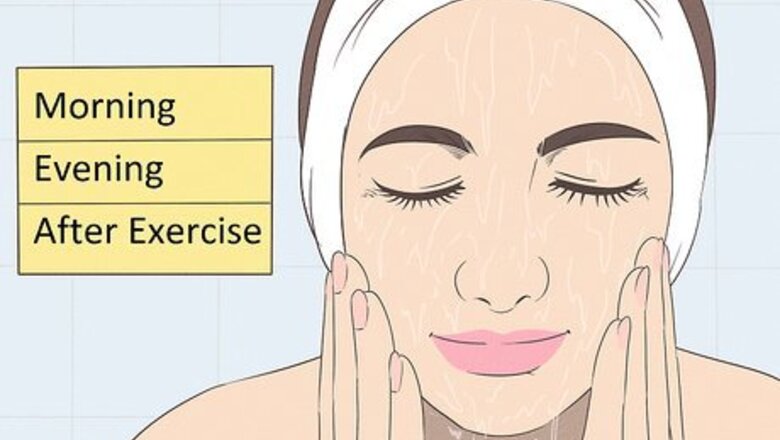
views
Maintaining a Regular Skin Care Routine
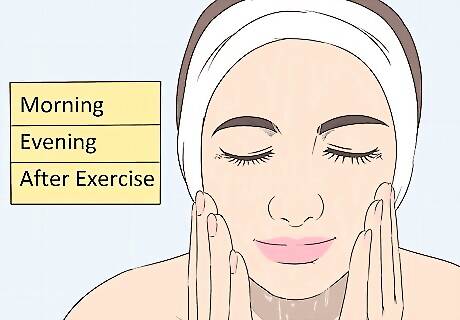
Wash your face every morning, evening, and after exercise. As part of your regular skin care routine, you should wash your face with a gentle cleanser twice each day: in the morning and before you go to bed. Remember that a gentle cleanser will be alcohol-free: alcohol can cause dryness and flaking. You should also wash your face after exercise to make sure that your sweat doesn't clog your pores or irritate your skin. Always use lukewarm--not hot--water when you wash your face. Hot water can dry you out and cause flaking as well as irritation. Resist the urge to scrub. Use your fingertips and a gentle touch to wash your face. This will minimize irritation, dryness, and unevenness in your skin tone.
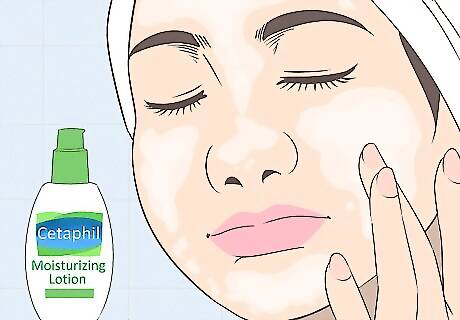
Moisturize every day. Skin moisturizers help to keep you skin from appearing dry, uneven, tight, and flaky. They can also help skin appear more youthful and glowing. Moisturizing properly can also reduce pimple outbreaks. Moisturize right after you wash your face or shower to help keep your skin's natural moisture in. Choose a moisturizer with ceramide to lock moisture deep into your skin. Shea butter is also a great moisturizer, but it's a nut derivative, so you have to be careful if you have a nut allergy. Glycerin and petrolatum are also good moisturizers. If you are prone to oily skin or clogged pores, look for moisturizers that are "noncomedogenic" to help keep your skin clear.
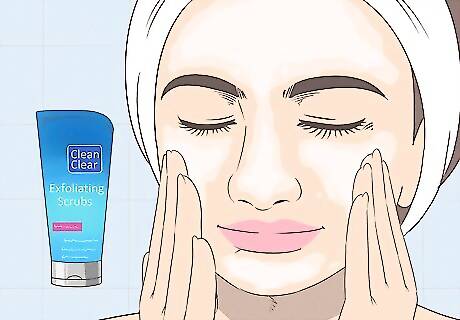
Exfoliate once or twice a week. Getting rid of dry, flaky skin cells will allow your skin to look more youthful and glowing. You can use either a physical exfoliant, such as a scrub, or chemical exfoliants that use ingredients like glycolic, citric, or lactic acid to remove the dead cells that can leave your skin looking dull. If you have very dry, dull skin, you might exfoliate as much as 2-3 times a week. If your skin is more sensitive, once a week is probably sufficient. If you have skin issues such as rosacea, extremely sensitive skin, or acne, you might not want to exfoliate, however. Exfoliating scrubs can be irritating to these skin types.
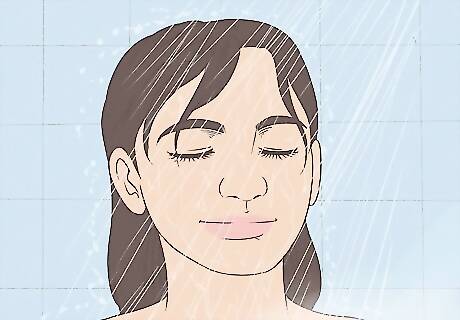
Take shorter, cooler showers. Hot showers can strip skin and dry it out, making it appear older and less healthy. Taking shorter, lukewarm showers will help your face stay healthy as well as the rest of the skin on your body.
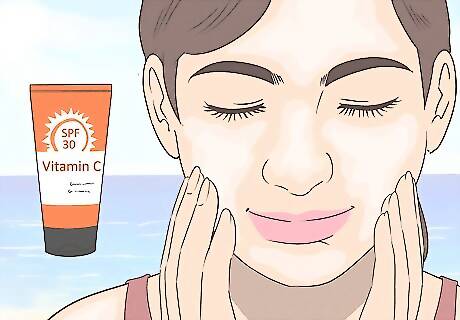
Use sunscreen daily. Using an SPF 30 sunscreen daily will help prevent skin damage such as fine lines, wrinkles, and discoloration. The sun can also aggravate acne, so you want to protect your skin. Reapply every few hours if necessary, especially if you are sweating or swimming. If your pores clog easily, try to find a sunscreen that has "noncomedogenic" on the label. That means that it is not oil-based and is less likely to clog your pores. Wearing sunscreen when you're younger can make a big difference in what your skin looks and feels like as you age. It can also decrease your risk of developing skin cancer.
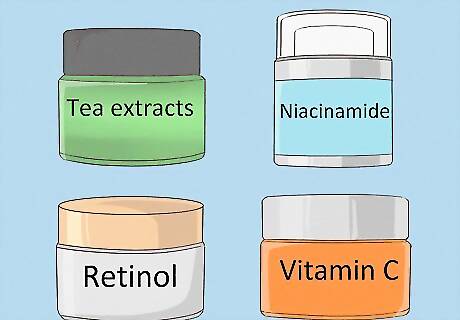
Use an anti-wrinkle cream. Anti-wrinkle creams do not eliminate wrinkles, but they can sometimes mask their appearance to make skin look smoother and younger. You should keep your expectations for anti-wrinkle creams low, but they might help your skin look healthier temporarily. Look for ingredients such as retinol, tea extracts, niacinamide, and Vitamin C. These ingredients may help improve skin elasticity and remove damaged skin cells.
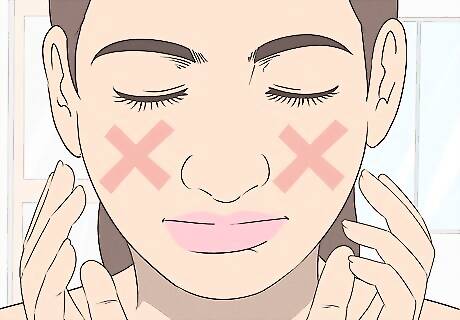
Do not touch your face. Touching your face can spread bacteria and skin oils. These can lead to breakouts, infections, or scarring. If you want clean, clear, and glowing skin, you cannot touch or rub your face.
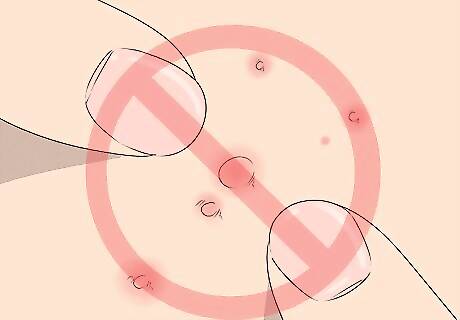
Never pop a pimple. It might be tempting to get rid of pimples through popping them. However, this can simply lead to more acne outbreaks, and you also increase your risk of scarring. You will have to be patient and let the pimples clear up on their own. Your skin will be healthier--and will look better--in the long run.
Maintaining Healthy Habits
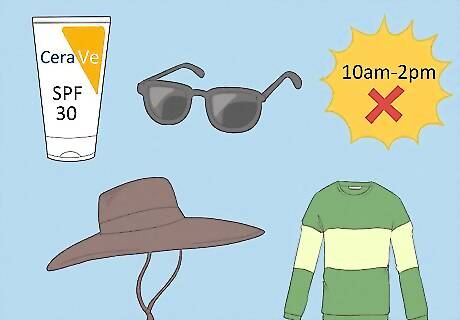
Stay out of the sun. Sun damage not only heightens your risk of skin cancer but also makes your skin more susceptible to lines, wrinkles, and unevenness. To keep your skin healthy and beautiful, use an SPF 30 sunscreen daily, wear hats and protective clothing, wear sunglasses, and stick to the shade. The sun causes the most skin damage between 10am and 2pm, so you should be especially careful at that time of day.
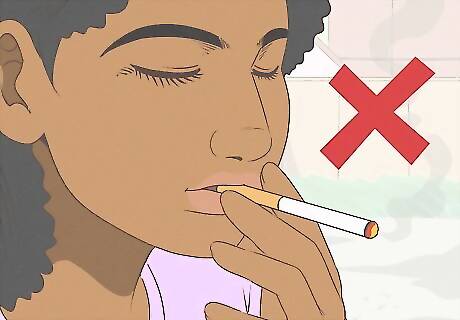
Quit smoking. Smokers develop more lines and wrinkles than nonsmokers. Smoking slows the ability of the body to repair wounds, which can lead to scarring. Nicotine constricts blood vessels as well, which doesn't allow your skin to renew itself properly. Plus the expressions smokers make (such as pursing their lips) lead to extra wrinkles around the lips. Stop smoking as soon as you can to allow your skin to recover its youthful, healthy appearance. There are many other reasons to quit smoking too: smoking increases the likelihood of cancer--including skin cancers. This isn't just a beauty issue; it is also a health issue.
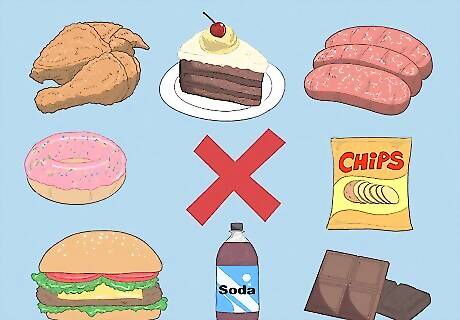
Avoid junk foods. Your diet affects the appearance of your skin. Foods that raise blood sugar can lead to acne, wrinkles, and irritation. Sugary foods can even reduce skin elasticity, leading to sagging. Stay away from processed foods that are full of white flour and added sugars. Staying away from junk foods is easier if you keep lots of delicious, healthy options in your home. For example, ripe berries can satisfy your craving for sweets, and roasted almonds can satisfy your craving for crunch. Consider incorporating fruits and vegetables into your daily life by adding them to your favorite foods such as oatmeal, pizza, or sandwiches. The more you fill up on healthy foods, the less you will crave unhealthy junk.
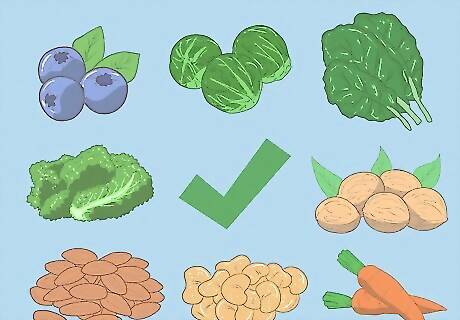
Eat antioxidant-rich foods. Foods that are rich in anti-oxidants are an important part of a healthy diet. These foods include whole fruits and vegetables, and they are often brightly colored. For example, blueberries, dark leafy greens, nuts, and carrots are all excellent foods to preserve your skin. Not only are these foods generally healthy but they may also help reduce the free radicals in your system, minimizing skin damage.
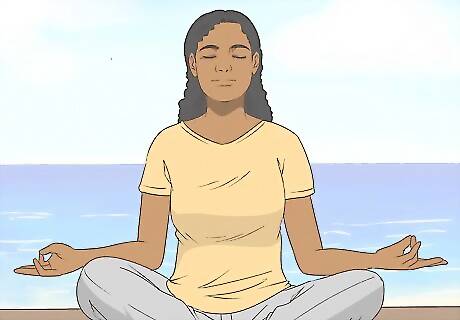
Stay relaxed. There are links between stress and skin appearance. Stress can make you more susceptible to acne breakouts, wrinkles, and bags under the eyes. Staying relaxed will also help keep you from frowning, which can cause unsightly wrinkles. If you have trouble handling the stress in your life, consider: Meditation. Meditation can help you minimize stress and regain balance in your life. Taking a walk outside. Moving around in nature for 20-30 minutes--especially on sunny days--can help make you feel more relaxed and happy. But because you want to avoid sun damage at all costs, be sure that you wear sunscreen, wear a hat and UV protective clothing, and stay in the shade as much as possible. If you walk outside before 10a.m. and after 2p.m. you are also less likely to experience sun damage. Breathing deeply. Find a quiet spot in your home where you can sit comfortably and with good posture. Practice breathing slowly through your nose, holding your breath for a few seconds, and then breathing slowly out through your mouth. Do this for 10 minutes every morning to regain your focus and shed stress.
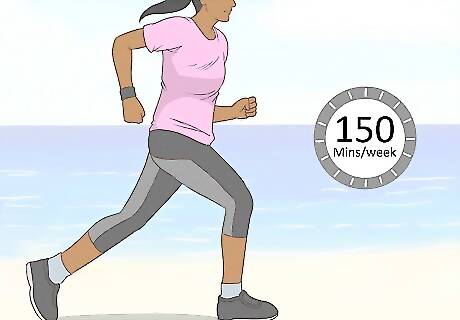
Exercise regularly. A toned body will make your skin appear more youthful and less saggy. Some studies also show that people who exercise have healthier, more youthful skin. It is unclear how much you need to exercise to get more youthful skin. In general, however, it is recommended that you get at least 75 minutes of strenuous aerobic activity per week and do strength training twice a week. Strenuous aerobic activities include running, swimming, and biking. You can get similar benefits from spending twice as much time doing lower-impact aerobic activities such as 150 minutes of walking per week. Be sure that you shower and wash your face after exercise: sweat can irritate the skin and lead to clogged pores.
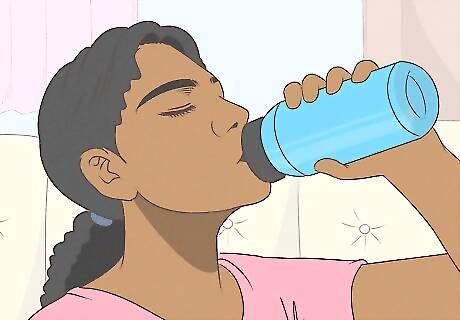
Stay hydrated. Drinking 8 glasses of water each day can help make your skin feel less tight, dry, and flaky. While the precise links between hydration and skin appearance are unclear, staying hydrated is good for overall health and certainly cannot hurt your skin.
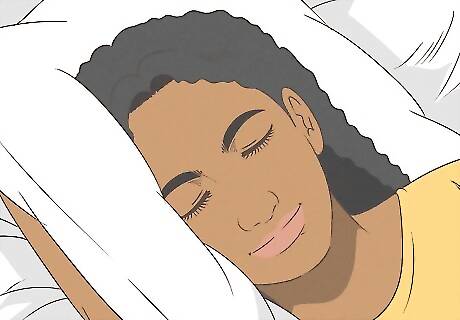
Get a good night's rest. The idea of "beauty sleep" is not a total myth. Not getting enough sleep can lead to skin sagging, bags under the eyes, discoloration, and signs of aging. The skin repairs itself overnight, which means you need to give your body time to heal and recover as you rest. Try to sleep at least 7-8 hours per night to give your skin a youthful glow. If you are having trouble sleeping at night, be sure that you: Have a set bedtime routine that you go through each night. Avoid bright screens--such as phones, televisions, and computers--before bed. Avoid caffeine and alcohol in the evening hours. Have a cool, quiet, dark place where you sleep.
Treating Skin Problems Without Makeup
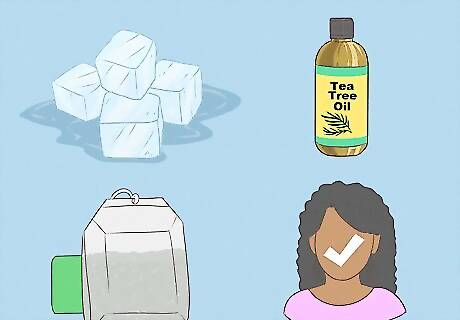
Minimize acne without makeup. There are ways that you can reduce the size and redness of pimples without resorting to makeup. In fact, makeup can sometimes worsen acne. If you have an unwanted zit, you can try: Applying a cold compress or ice cube. The cold might help reduce the redness and inflammation of a breakout. Applying a green tea bag. Green tea extract may be able to help reduce the size of a pimple. Using a tea tree oil ointment. Tea tree oil has naturally antibiotic properties and can help prevent the spread of acne. Using preventive measures. The most effective way to minimize a pimple is not to get one in the first place. Keep your skin cleansed, moisturized, and free of irritants in order to look good without makeup.
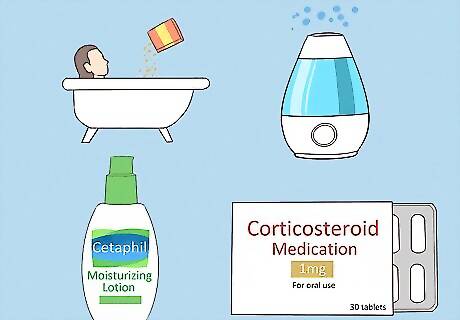
Clear up eczema without makeup. Eczema (aka atopic dermatitis) causes dry, flaky, itchy skin. There are many ways you can reduced eczema flareups and soothe your dry, red skin without resorting to makeup. For example you can: Take an oatmeal bath. Soaking in a bath along with baking soda and uncooked oatmeal can soothe irritated skin and reduce the redness caused by eczema. Keep your skin moisturized. Use moisturizer twice a day, use a humidifier at home, and apply wet compresses to affected areas. All of these techniques will keep your skin moisturized and will prevent you from scratching your skin, which worsens the condition. Make sure that your moisturizer does not have any fragrance or salicylic acid--these chemicals can exacerbate your condition. Talk to your doctor about corticosteroids. Cortisone cream and oral corticosteroids can help stop the itching and reduce flare-ups of eczema. There can be side effects, however, and many of these medications are not sold over-the-counter. Talk to your doctor or dermatologist about whether a prescription-strength corticosteroid is the right choice for your condition.
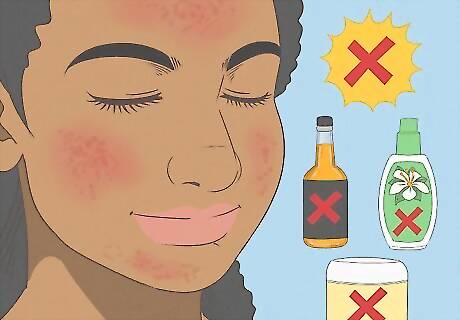
Improve rosacea without makeup. Rosacea is a condition that leads to unwanted redness and bumps on the skin. It has no permanent cure, but it can be medically managed. The most important thing to do is to avoid the triggers that make rosacea worse, such as sun damage, alcohol, fragrance, and exfoliating scrubs. It is also helpful to take lukewarm showers instead of hot showers so that your skin is protected. Topical antibiotics such as metronidazole might also be helpful in clearing up mild rosacea. Talk to your doctor about possible medications.

Finished. Selena Gomez Selena Gomez, Founder, Rare Beauty Learn to appreciate your natural beauty. "Makeup is something to have fun with, but not something you need. I used to think I needed to wear makeup to feel pretty, and I can definitely say that has changed as I've gotten older."














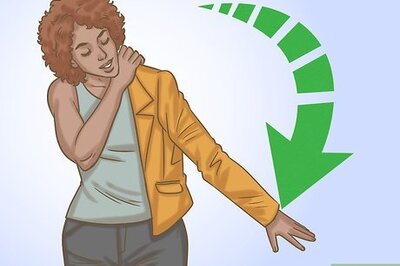



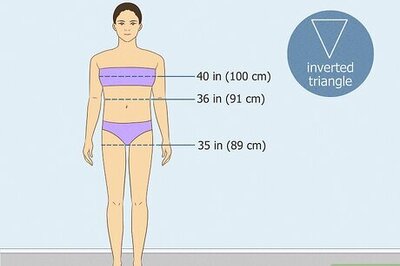

Comments
0 comment